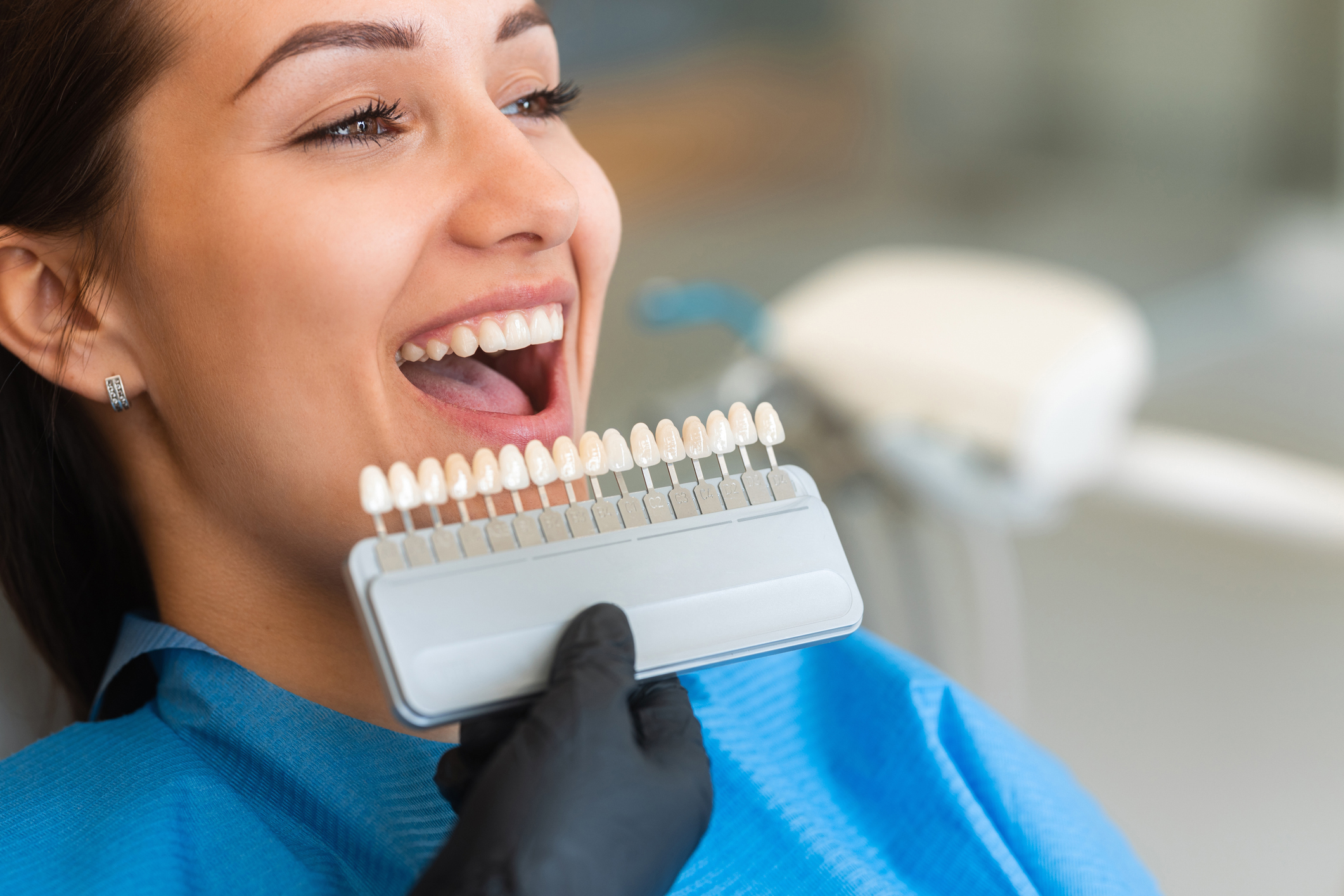Veneers and Crowns
Home » Treatments » Cosmetic Dentistry » Veneers and Crowns
Dental Veneers
Your path to a perfectly polished smile
A veneer is a thin tooth-coloured shell placed on the front of a tooth to improve the appearance of discoloured, irregularly shaped or damaged teeth.
Veneers can improve the appearance of teeth and make a difference to your smile. They are usually fitted to the front upper and lower teeth, and made from ceramic, porcelain or a composite material. Veneers offer a minimally invasive way to transform a tooth as only a very thin layer of enamel is removed (if any) prior to fitting.
What are the benefits of having dental veneers?
- Veneers can significantly enhance the appearance of your smile by covering up imperfections such as chips, cracks, discoloration, or gaps.
- A beautiful smile can boost your self-esteem and confidence.
- Veneers are made from durable materials, such as porcelain or composite, that can last for many years with proper care.
- Veneers are less susceptible to staining compared to natural teeth (and composite bonding), making them a great option for those who enjoy coffee, tea, or red wine.
- Veneers generally require minimal tooth preparation, preserving more of your natural tooth structure.
- Modern veneer technology allows for a highly natural-looking result that blends seamlessly with your surrounding teeth.

What is involved in having veneers?
Before beginning the veneer process, we’ll schedule a consultation to assess the health of your teeth and gums. We will discuss what your end result could look like and what your goals are. A treatment plan will be created for you so that you can see prices and a rough timeline of your treatment. If necessary, we will take impressions of your teeth to create models that will be used to design your veneers. These models can help us visualise how the veneers will enhance your smile.
Once you’re satisfied with the proposed treatment plan, we’ll prepare your teeth by removing a thin layer of enamel. A scan or impression will be taken and sent to the lab, where they will begin to make your custom veneers. To protect your teeth during the process, we’ll provide temporary veneers.
When your veneers are ready, we’ll schedule an appointment to fit them. We’ll ensure the final result meets both ours and your expectations before permanently attaching the veneers using dental adhesive.
Looking after your dental veneers
After fitting, it is important to keep your veneer well-maintained with regular brushing and flossing. We will show you how to keep on top of your dental hygiene and keep a close eye on the health of your teeth and gums.
Although veneers are resilient, it is important to treat them with care. It is important to avoid habits such as biting your fingernails or chewing pen tops or using your teeth to open anything. Also, it is probably best to steer clear of very hard foods that could cause damage to the veneer.
Veneers provide a quick and effective solution for achieving a radiant, flawless smile. Whether you’re looking to correct minor dental issues or completely transform your teeth, veneers offer a durable, natural-looking, and long-lasting solution that can boost your confidence and leave you grinning with pride.
Dental Crowns

Protective covers for damaged teeth
Crowns offer a neat, natural-coloured way to cover up unsightly teeth, protect them from further damage, and enhance strength and durability. They fit completely over a whole tooth, concealing defects caused by chips, decay, discolouration or large fillings. Crowns strengthen and protect the remaining tooth structure and can greatly improve the appearance of your smile.
What are the benefits of dental crowns?
- Restore the natural shape of a tooth
- Assist in the restoration of proper tooth function
- Provide strength and durability
- Allow a misaligned tooth to be straightened
- Protect a weak tooth from further damage
- A natural-looking finish
- Create a beautiful and even smile
What is involved in the treatment?
We first ensure that the internal structure of the tooth is intact and that there are no signs of infection present. We prepare your tooth by removing a layer of tooth structure, making sure we leave a strong core.
We take impressions or a scan of your teeth and record their colour, and send this to the laboratory, so your crown can be made to fit perfectly. Between appointments, we protect the prepared tooth with a temporary crown.
When your crown is ready, the temporary crown is removed. We’ll ensure the final result meets both ours and your expectations, and the new permanent crown is fixed in place with a strong dental cement.
Veneers and Crowns FAQs
How do I look after my crown?
The best way to care for your crown is to stay on top of your oral hygiene – this means keeping your teeth and gums healthy by brushing with a fluoride toothpaste twice a day and flossing between your teeth. You also need to see your dentist, and hygienist regularly for check-ups and cleaning, so they can keep an eye on your crown and the tooth underneath.
Can I choose the colour of my crown?
You are able to choose the colour of your crown, based on your personal preferences. We may advise you of the shade which would best match your natural tooth colour, but it is ultimately up to you. If you are considering having whitening treatment, you may prefer to have this treatment first, as whitening is not effective on crowns and your crown can then be made to match your new shade.
Is getting a crown painful?
We use local anaesthetic to numb the area before preparing your tooth for a crown, and fitting the crown itself to make sure you won’t feel any pain. We take the time to ensure you feel relaxed and comfortable before beginning any treatment. Many patients find that having a crown is no more uncomfortable than a filling.
Why do I need a dental crown?
Crowns are commonly used to repair damage that has affected the structure and functionality of a tooth. For teeth that have had multiple fillings, extensive decay, and general damage, a crown is the way forward. In many cases, we use a crown to restore a tooth following a root canal treatment for an aesthetic and reliable finish. They can also be used to support a dental bridge or fixed to a dental implant for a highly aesthetic finish.
How do I look after my veneers?
After fitting, it is important to keep your veneer well-maintained with regular brushing and flossing. Your dentist and hygienist will show you how to keep on top of your dental hygiene and keep a close eye on the health of your teeth and gums.
Can veneers break?
Although veneers are resilient, it is important to treat them with care, so try not to bite your fingernails or chew pen tops or use your teeth to open anything. Also, it is probably best to steer clear of very hard foods that could cause damage to the veneer.
Are veneers permanent?
In many cases, fitting porcelain veneers requires some of your natural tooth enamel to be removed. Therefore, they are an irreversible treatment, designed to be kept on your teeth permanently. Your veneers themselves can last up to 15 years before needing to be replaced, depending on how well you look after them.
Are veneers painful?
You shouldn’t find either the treatment for veneers or the veneers themselves painful. We use a local anaesthetic to minimise your discomfort during the preparation and fitting process and ensure you are relaxed and ready before beginning any treatment. Most patients experience no pain or discomfort at all. You may feel some sensitivity once your veneers have been fitted, but this should go away after a few days.





